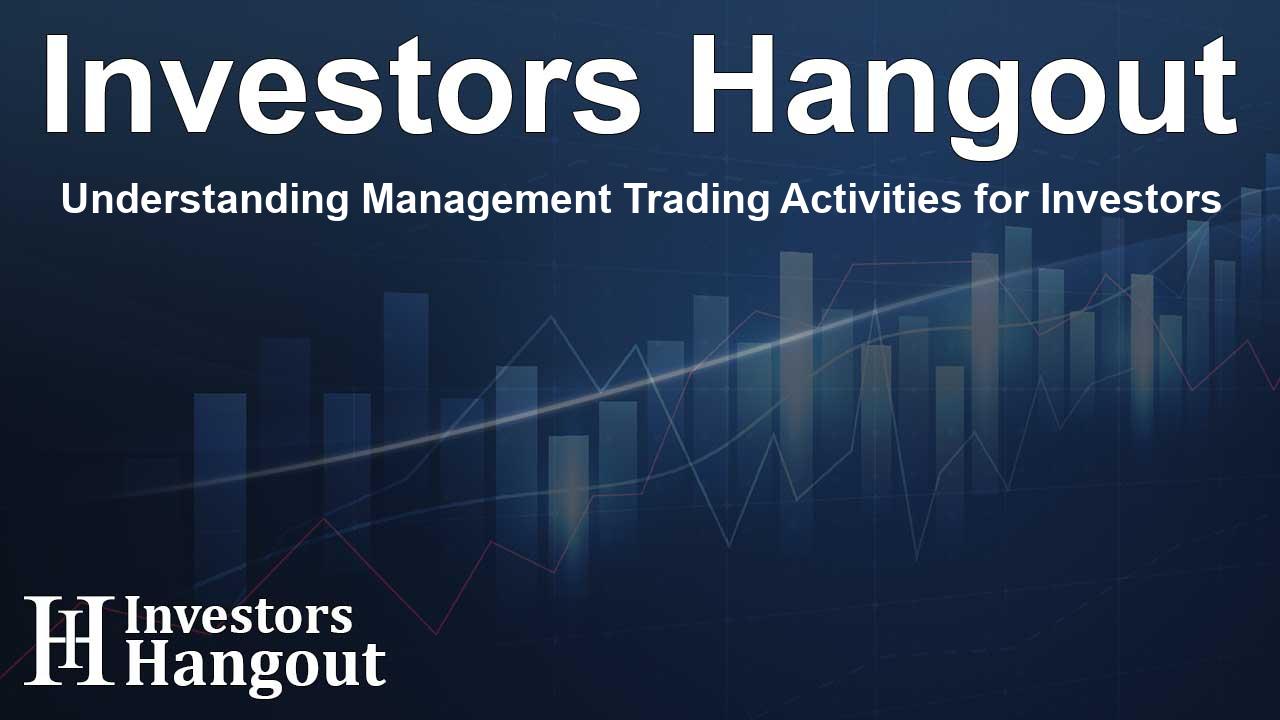Understanding Management Trading Activities for Investors

Understanding Management Trading Activities
The actions and decisions made by management and their close associates regarding stock trading are of significant interest to investors. These activities can reflect their confidence in the company's future and overall market sentiment. Specifically, when management makes trades, it often garners attention and can impact stock performance. Investors benefit greatly from understanding these dynamics.
The Importance of Transparency in Trading
Transparency in management trading is crucial for maintaining investor trust. Regulatory bodies require senior management to report their trades to prevent insider trading and ensure fair market practices. These reports provide a glimpse into the confidence levels of executives regarding their company's stock. When management buys shares, it can signal optimism about future growth, while selling might raise concerns among investors.
How Trades are Reported
Management trades are typically reported through official disclosures that detail the nature of the transactions. These filings may include the number of shares traded, the price at which they were sold or purchased, and the purpose behind the transaction. Investors should closely monitor these reports to glean insights into management's perspectives.
Trends and Patterns in Trading
Examining trading patterns among company executives can reveal trends that might protect investors from unforeseen risks. For instance, consistent buying by management during slight dips might indicate a strong belief in the company's long-term prospects. Conversely, frequent selling could suggest that management anticipates a downturn or external challenges.
Impacts of Management Trades on Market Sentiment
When high-ranking officials trade shares, it can create ripples of sentiment in the market. Investors often interpret these moves as endorsements or warnings. A significant purchase might boost stock prices, as other investors seek to capitalize on management's confidence. Alternatively, substantial sell-offs can lead to panic selling and decreased stock value, emphasizing the need for careful analysis.
Components Influencing Management Trading
Various factors influence why management might trade shares. Company performance metrics, upcoming product launches, market conditions, and personal financial strategies can all contribute to these decisions. Understanding these elements enables investors to critically analyze management's actions and position themselves accordingly.
External Factors Affecting Trades
Market conditions significantly affect management trading decisions. Economic indicators, industry trends, and geopolitical events can prompt management to buy or sell shares based on current perceptions of risk and opportunity. Investors should remain aware of these external variables.
Best Practices for Investors
For savvy investors, monitoring management trading can be a vital tool in developing strategies. Making informed decisions based on the analysis of trading activities can lead to better outcomes. Investors are encouraged to combine this information with other financial analysis tools to form a comprehensive view of the company’s potential.
Frequently Asked Questions
What is management trading?
Management trading refers to stock transactions conducted by senior executives and their close associates, often viewed as indicators of confidence in a company's prospects.
How can investors track management trades?
Investors can track these trades through official regulatory filings which disclose the details of the transactions made by management.
What does a significant purchase by management mean?
A significant purchase by management typically indicates strong confidence in the company’s future performance, suggesting that the stock may be undervalued.
Why do management trades impact stock prices?
The perception of management's confidence or concern can lead to changes in investor behavior, which directly affects stock prices.
What should investors consider before acting on management trades?
Investors should consider the broader market context, company performance, and personal financial goals before making decisions based solely on management trades.
About The Author
Contact Caleb Price privately here. Or send an email with ATTN: Caleb Price as the subject to contact@investorshangout.com.
About Investors Hangout
Investors Hangout is a leading online stock forum for financial discussion and learning, offering a wide range of free tools and resources. It draws in traders of all levels, who exchange market knowledge, investigate trading tactics, and keep an eye on industry developments in real time. Featuring financial articles, stock message boards, quotes, charts, company profiles, and live news updates. Through cooperative learning and a wealth of informational resources, it helps users from novices creating their first portfolios to experts honing their techniques. Join Investors Hangout today: https://investorshangout.com/
The content of this article is based on factual, publicly available information and does not represent legal, financial, or investment advice. Investors Hangout does not offer financial advice, and the author is not a licensed financial advisor. Consult a qualified advisor before making any financial or investment decisions based on this article. This article should not be considered advice to purchase, sell, or hold any securities or other investments. If any of the material provided here is inaccurate, please contact us for corrections.
